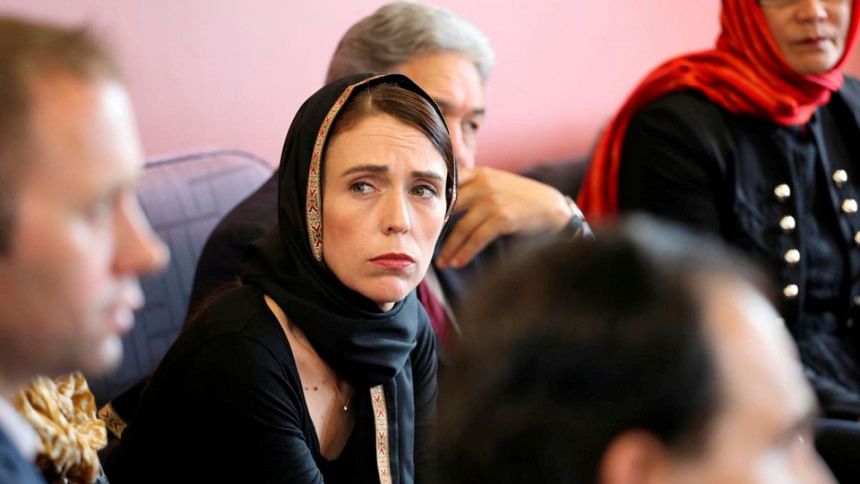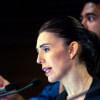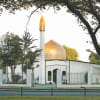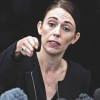Jacinda Ardern: What leadership should look like

The horrific Christchurch attack that took away at least 50 lives was one of New Zealand's darkest days. The country of about five million is still reeling from the shock of the gruesome attack on two mosques by a man in his late 20s whose sickening motivations behind the attack are now clear. This was apparently his way of retaliating against the "invasion" of foreign lands by migrants.
For those of us watching from afar the developments that continue to take place, it's refreshing to see the outpouring of support, love and compassion of the people of New Zealand towards the Muslim community. People have vowed to guard mosques and stand watch and Maori gangs were seen performing the haka—a ceremonial war dance—to honour the victims of the attack. These universal moments of poignancy and solidarity are a testament to the fact that those willing to divide and spread hate are only a minority, and that humanity is not dead.
If divisive political rhetoric in the West is largely to be blamed for the rise of white nationalism, isn't it also true that exemplary leadership can bring out the best in the people whom leaders govern? Because that's what comes to mind when I think of the powerful way in which the people of New Zealand have come together and the way in which New Zealand Prime Minister Jacinda Ardern conducted herself in the wake of the worst mass shooting in the country's modern history. The two, I believe, are strongly related. Leadership matters.
"Our power is in our choice of how to respond to the challenges and crises in our lives." Ardern, the youngest female prime minister in the world, recognised that power from the get-go and proved her mettle in the course of action following the attack. Not only does the media around the world seem to have fallen in love with her, but she has also won millions of hearts—from Australia to Bangladesh—as evident by people's reactions on social media.
First, on the day the attack took place, Ardern, in a strongly-worded speech, termed the massacre as a "terrorist attack." This is significant because in the aftermath of any attack, regardless of the number of fatalities, there is quite a bit of hesitation on the part of world leaders when it comes to calling an attack for what it is. Statements issued by presidents and prime ministers following violent attacks are often carefully crafted, so that terms with heavy political connotations are steered clear of—given their obvious implications for domestic politics and international relations. For instance, in 2015, after the Chapel Hill shootings that killed three Muslim students, the police claim that the killer, Craig Stephen Hicks, seemed to have been motivated by a longstanding "parking dispute" led to outcry among many, including the victims' families. The facts didn't point to it being a parking dispute, and previous encounters between Hicks and the victims increasingly pointed it to be a hate crime. After a long bout of silence, President Obama finally issued a public statement which, despite its sympathetic tone, cautiously avoided even a mention of the possibility of it being a "hate crime," although the FBI was looking into whether it was a hate crime or not.
Granted that in the case of the Christchurch attack, it became obvious very early on that this was indeed a terrorist attack due to the trail of evidence left by the attacker (74-page manifesto, scrawlings on his weapons), and for Ardern to say otherwise would have been political suicide. But one must appreciate the swiftness with which she termed the massacre a "terrorist attack". There's a big difference between denouncing and condemning an attack and calling it for what it is.
Second, Ardern quickly made herself visible and accessible to the media instead of relying on a press secretary or spokesperson to do all the dirty work. We are used to seeing world leaders try their best to avoid face-to-face interaction with the media in the aftermath of an attack of this scale—worried about the repercussions if they slip up in the face of pressure from journalists, among one of the many reasons. As far as "quick" reactions go, what we see is a tweet or a short statement issued by the president/prime minister's press office speaking on behalf of him/her. PMs and presidents are usually seen talking to the press usually after some time passes, when emotions are not running as high. And this is where PM Jacinda Ardern is an exception to the norm.
From taking the responsibility of informing the people herself about the immediate developments on the day that the attack took place, to later talking to the media about the hurdles in the process of returning bodies to victims' families for burial, Ardern made sure she was there, and not someone else, to inform the people about all the goings-on—reflecting just how deeply involved and up-to-date she is.
Third, and perhaps most importantly, as many have already noted, PM Jacinda Ardern's strength of character was exemplified by the fact that she didn't (ab)use this opportunity to take a dig at her political opponents. What she did instead was quite stunning. She showed a willingness to acknowledge the flaws in the existing system, that too very early on, without any hesitation. When asked if her country could be a "blueprint" for other countries to follow in terms of how it deals with gun control, Ardern said New Zealand's gun laws are an example of "what not to follow." Such moments of honest introspection and frank admission in the political landscape throughout the world were not only rare, but non-existent—until now.
In the wake of offensive comments made by Turkey's President Recep Tayyip Erdogan, who, while campaigning for local elections, said that "anti-Muslim Australians would be 'sent back in coffins' like their grandfathers at Gallipoli (a WWI battle)" and who has been accused of using the horrific Christchurch video as an election prop, PM Jacinda Ardern refused to be dragged into a political imbroglio with Turkey when questioned by a journalist, saying she does not believe the nature of the relationship between New Zealand and Turkey has changed.
This is the first time that a government head has been so widely praised by so many people from all around the globe for showing the world what true leadership looks like. For giving the world a reason to be hopeful about being led by people whose intelligence and compassion outweigh a desire for petty political points. For setting an example for heads of government all around the world by avoiding caustic rhetoric against political opponents at home and abroad. And above all, for putting her constituents first.
Thank you, PM Ardern.
Nahela Nowshin is a member of the editorial team at The Daily Star.










Comments